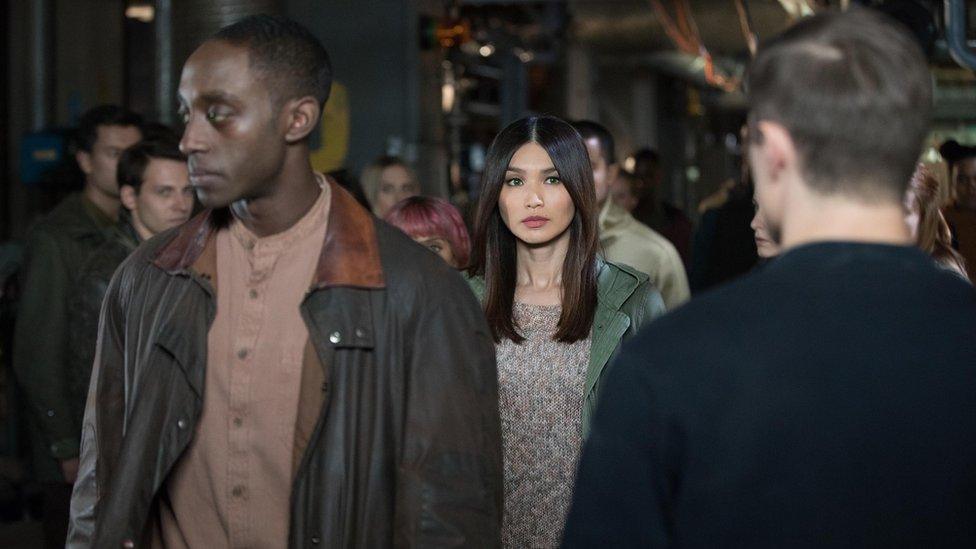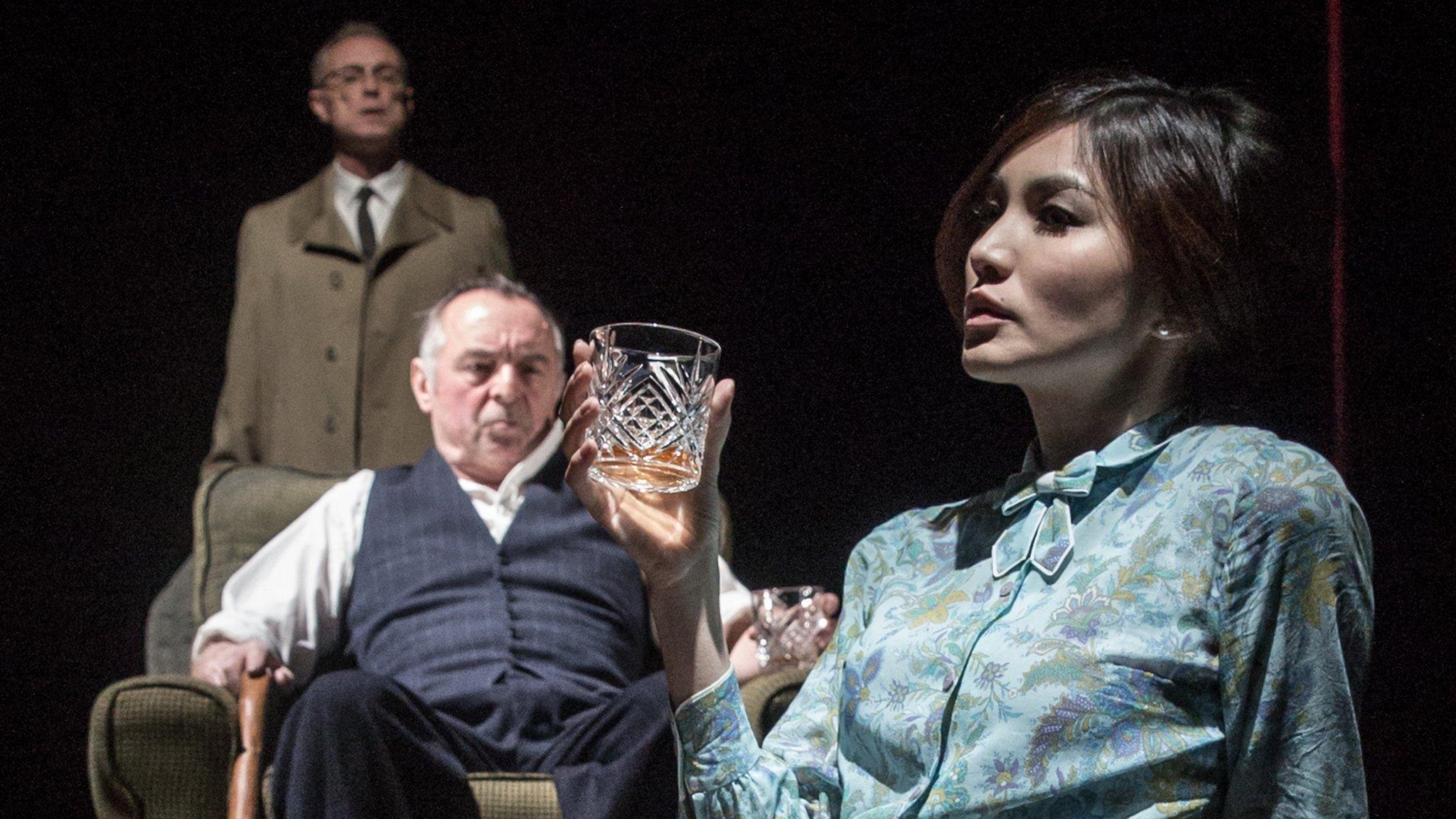How Channel 4's Humans was 'relevant in advance'
- Published
Warning: This article contains spoilers.

When Humans launched in 2015, it became Channel 4's most successful original drama for 20 years. It's now set for an explosive return - quite literally.
For a TV show set in a parallel present where people own domesticated robots known as synths - Humans is surprisingly realistic.
One of the show's key strengths - argues co-writer Sam Vincent - is its ability to explore contemporary issues in an indirect way, via the alternative universe it's set in.
By virtue of the synths - short for synthetic humans - the show investigates not just artificial intelligence, but complex social issues.
"All human worries, all worries about mankind, it helps if you discuss them by displacing them slightly," says Vincent, who created the show with Jonathan Brackley.
"So if you create artificial intelligence and you call it a thing that doesn't actually exist in the world right now that is imminent, it allows you to discuss the problems that are actually troubling humankind."
Problems which Humans is set to explore this season include division, racism and terrorism - although all are fortunately explored in a non-preachy way.

Ivanno Jeremiah and Gemma Chan reprise their roles in the new series
"We try to be relevant a year in advance," laughs Vincent - referring to the sudden topicality of some of the issues the show raised prior to the political turmoil that followed its launch. "As it turns out, division is still a thing.
"But we try to be even-handed about it, it's not just 'poor little synths, look how badly we treat them' - we see the emergence of a terrorist cell... we try and cover every side of it."
Humans is an adaptation of Real Humans - a Swedish sci-fi series which premiered in 2012.
The new season of the British version picks up one year after the close of the second, which saw the whole of the synth population granted sentience.
The first episode acts as something of a crash course of the story so far - particularly helpful for anyone who hasn't seen the first two seasons.
There are hints and reminders about the parallel world viewers are once again being transported to, and the impact that domesticated robots had on society.
One homeless man on the street holds up a sign reading: "Synth took job."
School children are given lessons about how synths with green eyes are dangerous, whereas the new generation of orange eyes are safe and obedient.

Allow Instagram content?
This article contains content provided by Instagram. We ask for your permission before anything is loaded, as they may be using cookies and other technologies. You may want to read Meta’s Instagram cookie policy, external and privacy policy, external before accepting. To view this content choose ‘accept and continue’.

In one scene, MPs and commentators are seen debating on a TV panel show the kind of issues that make you think it could be taken from a real-life panel show.
Does the emergence of a terror cell within the green-eyed community render all of them dangerous?
Or are campaigners for synth rights correct to argue they should not all be tarred with the same brush?
For Ivanno Jeremiah's character Max, there are several difficult decisions to be made, as he takes on a leadership role in synth society, encouraging peace and denouncing terrorism.
"Heavy wears the crown is the statement that really rang true playing Max this season," he says.
"There couldn't be any more things go wrong in his leadership. There are people who disagree with his peaceful stance... many hard decisions do have to be made, but he manages to balance it."

Gemma Chan says her character Mia "definitely feels a certain amount of guilt and responsibility for what happened" at the end of series two.
"The release of the consciousness code was to save her life, essentially. So that's something that weighs quite heavily on her," she says.
"So she's ended up in this kind of default position of being the face of the synths, and she's struggling with that. She doesn't feel that they're achieving what they hoped to achieve in this past year."
As a result, Chan explains, Mia goes off on "quite a different journey" this series to one viewers might imagine.
"How do you fight for the rights of your people? Do you do it within the law? Is it civil disobedience? What approach is the right thing to do? And I think she is kind of weighing up all those options, and she goes in a direction that is not necessarily expected."

Allow Instagram content?
This article contains content provided by Instagram. We ask for your permission before anything is loaded, as they may be using cookies and other technologies. You may want to read Meta’s Instagram cookie policy, external and privacy policy, external before accepting. To view this content choose ‘accept and continue’.

The new series is certainly eventful, with the opening episode being, quite literally, explosive.
An early scene sees a bomb planted by the terrorist cell detonate in a bar which encourages human and synth integration.
"[Filming it] was just unbelievable, we were in Shoreditch and had this street blocked off," explains Emily Berrington, who plays Niska.
"And there was only one explosion that could happen, because once the windows had been blown out, that was it. So the build-up was absolutely massive.
"We had everybody on set, all the producers were there and the pressure was huge. But when it happened it really was incredible. I hope they warned everybody locally, I'm sure they did, because it was pretty intense and loud!"
It may be easy to think that playing synths - characters who are essentially devoid of human personality - is an easy job, but, Berrington points out, the role comes with practical difficulties for the actors.

Emily Berrington plays Niska, who is caught up in a terrorist attack in the first episode
"When I'm in the make-up chair, I start trying to think about being economical, not fidgeting and blinking, that's one of the hardest things, limiting the blinking.
"So I do try and think about it throughout the morning, beforehand."
She adds that the famous and formidable death stare we see from Niska on screen has been cathartic to get out any real-life frustrations.
"It's so firmly kept on set, that's where all the kind of anger and frustration we so very Britishly don't express in real life is stored up and released by Niska," Berrington laughs.
"So it's probably a form of quite unhealthy therapy in a way, to release that somewhere."
The third series of Humans begins on Channel 4 on Thursday 17 May at 21:00 BST.

Follow us on Facebook, external, on Twitter @BBCNewsEnts, external, or on Instagram at bbcnewsents, external. If you have a story suggestion email entertainment.news@bbc.co.uk, external.
- Published24 November 2015
